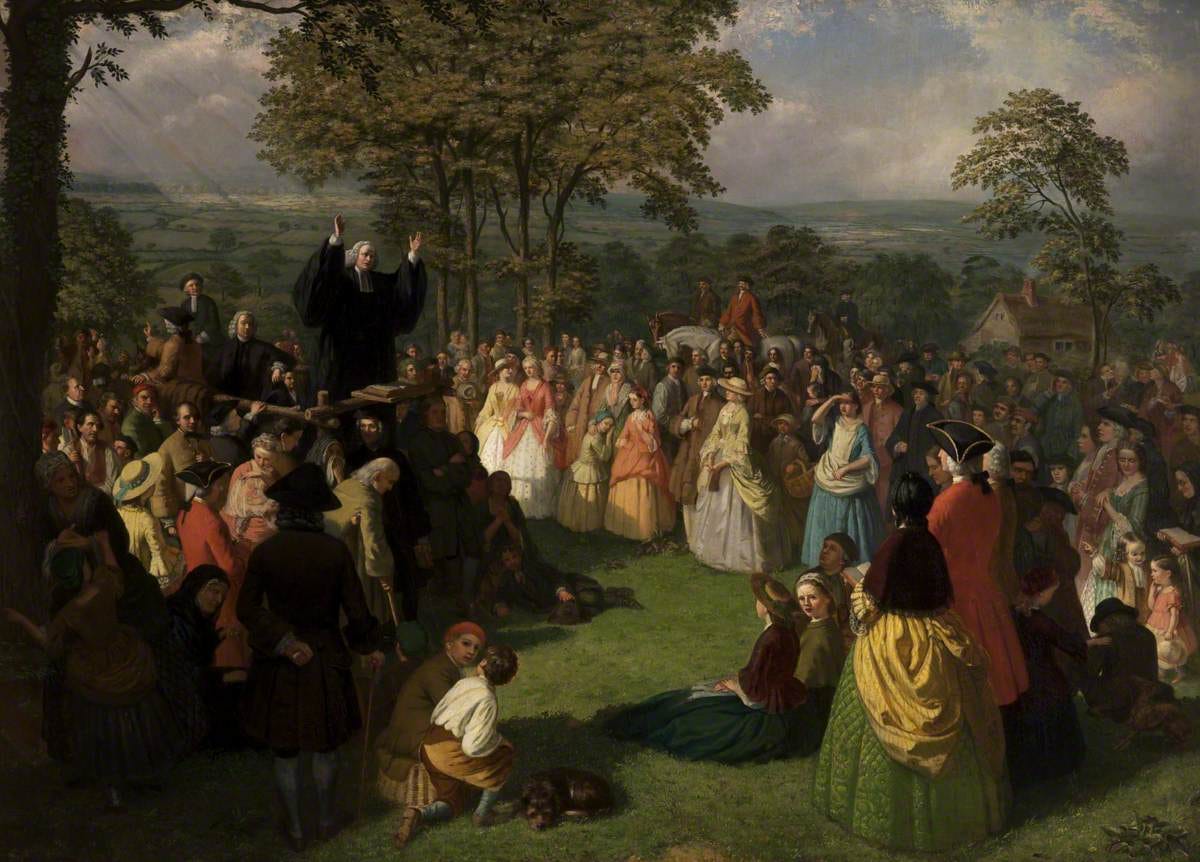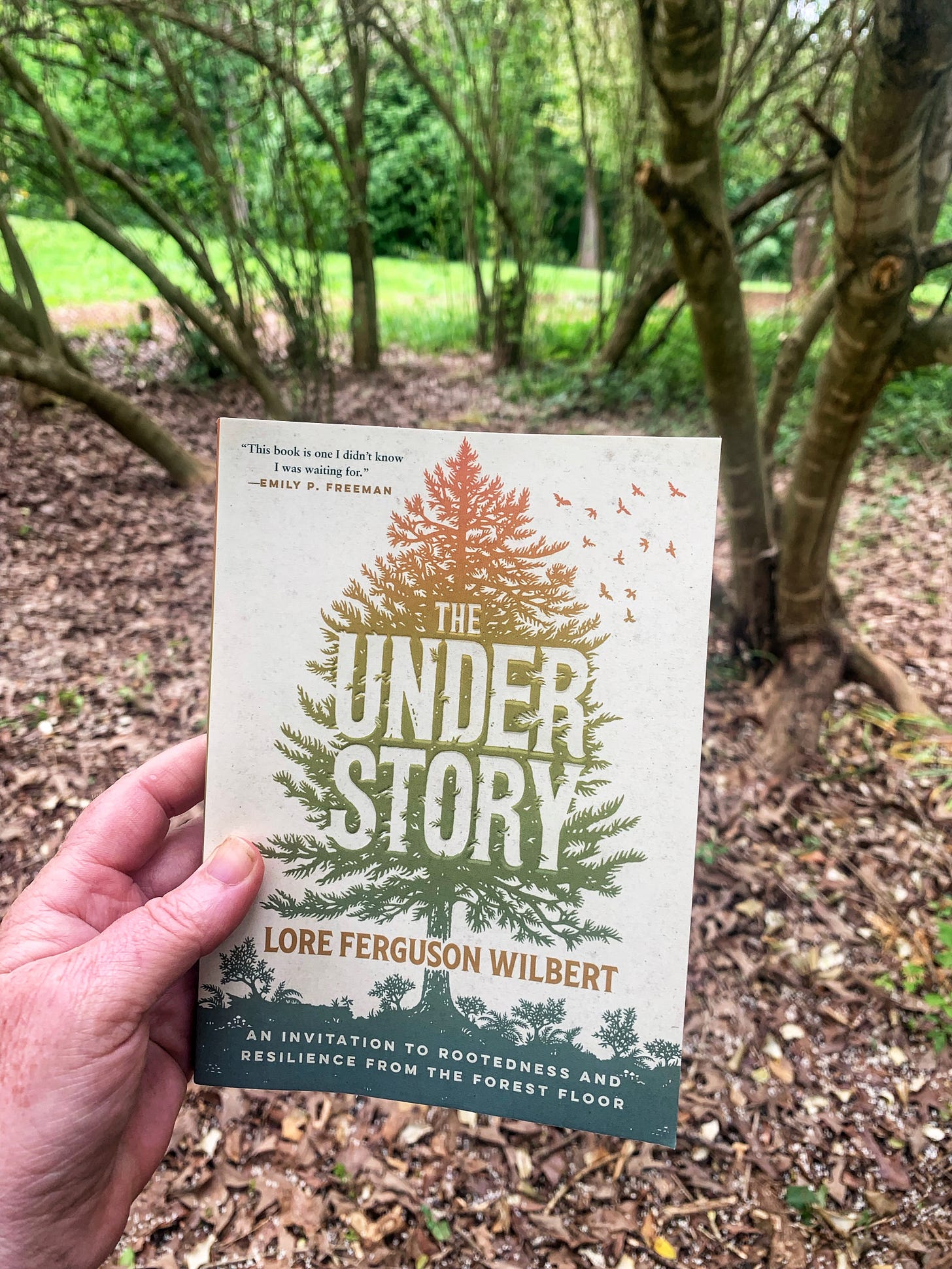[George Whitefield Preaching in Bolton, June 1750: https://artuk.org/discover/artworks/george-whitefield-preaching-in-bolton-june-1750-163882]
"Absolutely unmixed attention is prayer.”1
Here is the second in my occasional series on platform, publishing, and perspective. In this one, I want to focus on some terms.
PLATFORM
In the first installment in the series, I mentioned some recent observations from fellow writers on these topics (they are linked in Part 1). I also shared an essay I wrote a few years back arguing that a platform is built on your work. The platform is the work. That work could be the body of writing you have produced, it could be the experience you have gained working in a particular field, or it could be the authority you have gained through some unique or important experience. Your work is what you stand on—and that’s what a platform is, after all.
In some of the comments and conversations that followed that post, it occurred to me that another term that’s in the mix might offer further clarification. That term is audience.
AUDIENCE
I have come to see that we sometimes use the word platform when what we really mean is audience. In this numbers-obsessed, algorithm-driven culture, it’s especially easy to confuse the the two. Those who wish to enter the publishing world must, necessarily, build their audience. Hence, the emphasis on follower counts and engagement stats.
But let’s think about what audience is and how it’s different (or at least how I see it to be different) from platform. (The painting above of George Whitefield preaching gives a good visual: he is standing on a platform, speaking to an audience.)
Your social media following is your audience. A magazine’s subscribers and online readers are its audience. The students in a professor’s classroom are an audience. Concertgoers in an auditorium constitute an audience. Audience can also include potential readers, hearers, and supporters (meaning, potential audience).
One of the things publishers want to know is, Who is your audience?
If you are a writer (or a creator of any kind, or even in business), you need to ask, Who is my audience?
Platform is a what.
Audience is a who.
It can get fuzzy because in this celebrity-driven culture the “work” of gaining a wide audience is too often the “work” that is valued most.2 (I am putting that word in quotes here because this is akin to being famous for being famous. It really is an empty kind of work.)
A megachurch pastor who has an audience of thousands every week has what is called a “platform” (rather than an “audience”) when the numbers themselves are seen as the work. (And don’t get me wrong: it may have taken work to get that audience. But the audience is not the work.)
Conversely, a quality piece of writing that reflects solid work isn’t as likely to be published if the writer has a small audience.
To confuse audience and platform risks neglecting the work (the authority, the expertise, the very reason for having an audience). What good is it to fill up an auditorium only to step on the stage and deliver … a nothingburger.
The other thing is that if you draw an audience through a means that doesn’t reflect the work you ultimately intend to do, then that bait-and-switch will likely backfire at some point.
Mel Bjorgen, a fellow Susbstacker with whom I’ve had some fruitful conversations over the past few months, has learned this very thing. For a while, Mel bought into the content farming model (content farming is making content just to gain a following), and wrote about the hard and painful lessons learned from that kind of exploitation. She describes one email from one of many outfits promising better chances of publishing success for some hefty fees:
“When I clicked on the link, it told me that for only $35 a month, or $100 for three months (the popular deal), or $350 a year; I could receive support on how to navigate the world of publishing the Christian book I’ve been dreaming about writing. Becoming a part of their cohort not only gives me access to all this great advice I cannot see until I pay, but it also offers me the opportunity to pay an extra $300 in addition to the $800 general ticket I can buy to go to their annual conference, for a workshop specific to writers.”
You can read the entire post here:
Then in a follow-up post describing her decision to get out of the “influencer” business, Mel shared:
“This coming week, I will lay to rest my dear Facebook page of 7 years. As I announced it on my page, I told them of an alternative page that I created to promote my real-life platform as a suicide prevention coordinator and writing on Substack. Out of 11,500 followers, one hundred people have followed me on my new page. …. Those 11,000 followers were not following my work; they were following the content.”
WRITING VS. PUBLISHING
Finally, I want to talk about two terms that everyone knows are two different things, yet I find sometimes get muddled in our thinking and talking. At least it’s something I’ve noticed through conversations over the years. The distinction I want to illuminate is between writing and publishing.
I’m often asked for writing advice. I’ve learned that the first question I need to ask in return on such occasions is, “Do you mean writing advice or publishing advice?” Because these are two very different (though sometimes related) things. It seems that it’s easy to assume that if one writes something, well, of course it will be published! Why else would one write?
But one can write for many different reasons. One can publish for many different reasons, too. Certainly the reasons for these two actions can overlap, but they don’t necessarily.
Flannery O’Connor is famous for saying, “I write because I don't know what I think until I read what I say.”
If you write because that is the way you process things and figure out what you think, or if you write simply because you love to write, then that is the end of the matter. That is more than reason enough to write. You are your own audience. You matter.
But most of us do like to share our thoughts with others (whether they are written or not) as well as the things we create. That is natural and human. So we might read our writing to others or pass around the manuscript as Renaissance writers once did. Many works from centuries ago were not published in the writers’ lifetimes—partly because print culture hadn’t developed, but often merely because it was enough for these writers to share their work within a circle of friends.
Today, you don’t have to pass around one manuscript. Technology makes it easy to print and bind pages so you can make copies to give (or sell) to your friends. If you get positive feedback (from anyone but your mother, obviously), you might want to seek a wider audience. (Enter Substack!)
Writing doesn’t have to be your job for you to write. You don’t have to have an audience to write. (I will say, however, that having an audience—one that gives honest, critical feedback—is essential to improving your craft as a writer. Absolutely essential. Get yourself some honest readers and critics if you want your platform—your actual work—to be solid.)
I like the observation that Jared Wilson makes in his forthcoming book, The Storied Life:
“Maybe you are making a little money with an article here or there. Would you be doing this if you weren’t paid or ever published? That’s how you know if you are a writer. That’s how you know if you are called to writing or just desire a platform.”3
Or maybe just an audience.
THE QUESTION
Now here’s a question, readers. It’s one you can ponder for yourself alone, but I’d also love to read your answers and thoughts in the comments (open for all this week).
This question is for those who are within the “influencer” sphere, or trying to be—whether in publishing, social media, or some kind of content creation. Here is the question: What kind of work would you want do do—would you be doing—apart from all this if you could or you had to?
I’ve observed recently a few of my friends in these influencer spheres turn their attention to other kinds of work: teaching, health care, mental health professions, insurance, real estate, seminary training. I’m sure there are others.
I realize my own trajectory has been the reverse in losing a 25-year teaching profession (longer if you count all the adjunct work before that) and now becoming a full-time writer and speaker. But I think I’ve built a solid platform for the new work. We’ll see, I guess.
Next week, I will continue this series by discussing some of the hard realities about publishing today.
Then, we will begin reading John Donne together! Start here: https://www.poetryfoundation.org/poems/44106/holy-sonnets-batter-my-heart-three-persond-god
***
Thank you to all who read, subscribe, and share. It really helps! Please also consider becoming a paid subscriber, if you are able. Discounts are available for a group of two or more. Even the smallest bit of support helps me to do all that I do here and out there.
***
BOOK NOTE:
Today The Understory, by my friend Lore Ferguson Wilbert (who writes here at Sayable), releases into the world. Lore has meant much to me over the past several years. Her journey and mine have paralleled and overlapped in various ways. I’ve only just started reading this new book. But I will tell you, dear readers, that I didn’t have it open for two minutes before it made me tear up. This is a reflective, contemplative read. Lore’s writing has the kind of beauty in it that I aspire to in mine.
Simone Weil, Gravity and Grace, trans. By Emma Crawford and Mario von der Ruhr (London: Routledge, 2002), 117.
Katelyn Beaty’s excellent book, Celebrities for Jesus explores the deep hold of this phenomenon in the modern church: http://www.bakerpublishinggroup.com/books/celebrities-for-jesus/406890
Jared C. Wilson, The Storied Life: Christian Writing as Art and Worship (Grand Rapids, MI: Zondervan Reflective, 2024), 179.







I love that you are continuing this conversation. Thank you! I do write and will always write, but I want the bulk of my work to be in our local community and church. It’s very hard to untangle our desire for meaningful work with the allure (that’s sometimes centered directly at women) of being “someone” online.
As a marketing manager for a Christian publisher I do my best to encourage authors to engage in marketing activities that will build their audience (the numbers) while also developing their platform (the work). I truly believe this is the only ethical way to approach this landscape as a Christian, but it is a difficult balance to find.